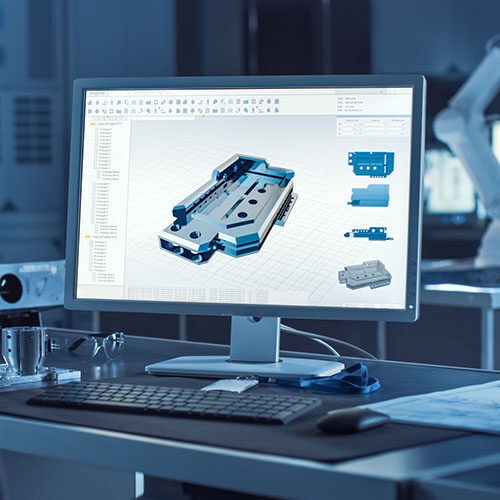
Learning how to manage change effectively is what turns a promising new idea into a successful reality.
People often think they are afraid of change, but what they actually fear is their ability to manage the change. Skillfully using change management tools and techniques—structured approaches to planning, implementing and guiding organizational change to ensure it is seamless and effective—will help you to overcome your fears, minimize resistance and achieve your desired outcomes when implementing new strategies, technologies or initiatives.
RELATED ARTICLE: How to Champion Change in Your Organization
Your ERP System is an Effective Change Management Tool
Many manufacturers have access to a change management tool that they have probably overlooked: An ERP system.
Without a comprehensive ERP system, navigating change is a nearly impossible task. If your company relies on disparate legacy software systems, you will lack a centralized internal communication system and struggle with information loss when implementing new changes. Implementing new business processes will become a harrowing ordeal, and any changes you try to make will become stuck in a cycle of endless repetition.
ERPs, on the other hand, facilitate communication and collaboration by centralizing information, enabling everyone to access the same data, reducing misunderstandings and enhancing teamwork. ERPs equip organizations with tools to effectively plan, implement and monitor changes, making the process more efficient and less disruptive to the overall workflow.
ERPs act not only as a centralized hub for communication and information but are also an effective business tool that can help you manage and implement change. For example, ERPs allow manufacturers to assess the impact of proposed changes on various aspects of their business, such as production schedules, inventory levels and financials, helping them to plan and mitigate risks effectively.
6 Ways Your ERP System Supports Change Management
1. Informed Decision-Making
Using dynamic reporting tools, ERP software pinpoints areas requiring adjustments—making it easy for you to know where you need to make changes.
Access to comprehensive business intelligence and reports from across your organization can help you identify places for improvement. Without an ERP, these opportunities may only become apparent when your profitability is at risk. But, ERP software ensures that changes initiated by your company are proactive and grounded in comprehensive business intelligence. Plus, change management initiatives driven by well-informed decisions are more likely to succeed than those stemming from a need to react urgently to crises.
2. Accurate and Accessible Information
Whether top-floor executives or shop-floor team members, access to accurate information is indispensable for effective change management.
During any change or transformation, everyone within your organization needs to have access to the same accurate information. An ERP system offers a singular source of truth that is accessible to all employees, facilitating transparency and clarity. Giving everyone access to the same reliable information fosters trust and diminishes resistance to change.
3. Process Standardization
ERPs help standardize and document processes, making it easier to communicate and implement changes consistently across your organization.
ERPs encourage organizations to standardize their business processes by defining and documenting how various tasks are performed consistently across departments. When change initiatives are introduced, employees already have a clear understanding of how things work, which simplifies the transition to new processes.
4. Better Communication
Accurately communicating change is essential not only for logistical reasons but also for conveying your rationale behind the change.
Successful change initiatives are made through relentless communication of vision and strategy — this is the only way you will get everyone on board. ERPs facilitate communication and collaboration by centralizing information, which reduces misunderstandings and enhances teamwork. Using an ERP system to enable dialogue ensures open communication channels that span departments and hierarchical boundaries.
5. Data Security
During times of change, unprotected data is susceptible to misinterpretation, duplication or loss.
ERP software promptly identifies data redundancies and inaccuracies, safeguarding against such risks. Integrating databases from all departments through an ERP system guarantees that information is cross-verified against existing records and housed in a secure environment.
6. Tracking and Reporting
ERPs provide tools for tracking the progress of change initiatives and generating reports to monitor their effectiveness, ensuring that adjustments can be made as needed.
ERP systems allow users to generate customized reports tailored to their specific needs. Change managers can create reports that focus on key metrics and indicators related to the changes, making it easier to assess their impact. ERPs also allow organizations to continually refine and improve their standardized processes. This promotes a culture of adaptability and continuous change readiness.
Conclusion
With the right ERP solution, change management can become effective, secure and collaborative.
And don’t wait until it’s too late: By adopting ERP software proactively—before the dire need for internal change arises—your business will be flexible and ready to take on change. When the time for change inevitably comes, your ERP system will help you facilitate communication and implement changes. Your ERP system will help you to not only weather change effectively but also thrive in the face of it. By harnessing the power of an ERP, you can navigate change with confidence.
RELATED ARTICLE: How to Future-Proof Your Manufacturing Business
Get your eBook Scared to implement a new ERP?
"*" indicates required fields



